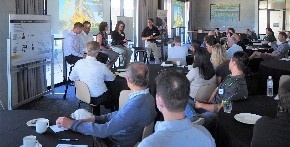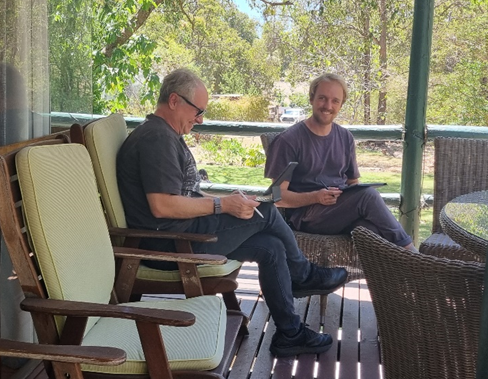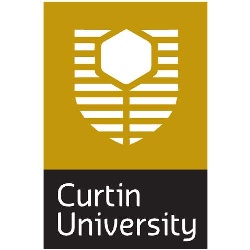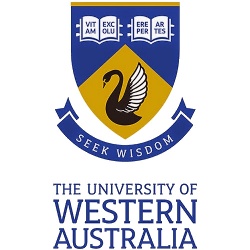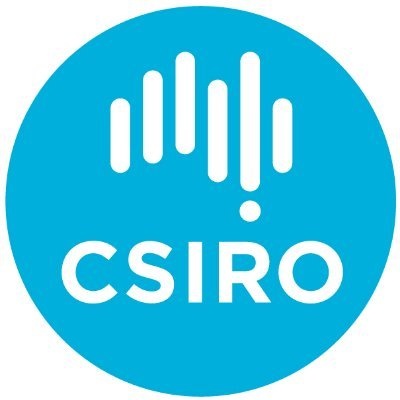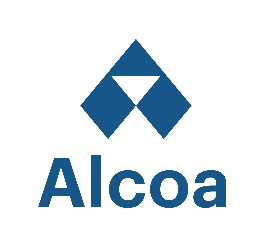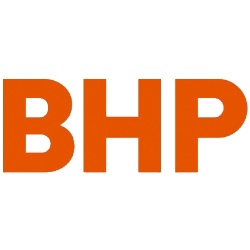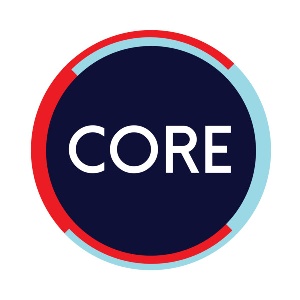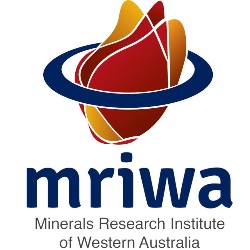Page History
Welcome to the first newsletter for 2023!
We ended 2022 with two events that showcased research across our themes to industry partners. The new year began with the arrival of two new post-doctoral researchers to the Centre. In May, they teamed up with a couple of PhD students to form a team that won a prize in the Iron Ore Circuit Hackathon. What a great start to 2023!
IN THE SPOTLIGHT
Congratulations to Team Bravo, which took out the 'Most Innovative Improvement' prize at the Iron Ore Circuit Hackathon 2023. The hackathon was hosted by Innovation Central Perth and Southern Ports Authority and facilitated by Innovation Cluster.
Team Bravo included Research Fellows Shuixiu Lu and Sirui Li, with PhD candidates Ziyu Zhao and Ryan Leadbetter, and Saf Flatters, Shutdown Execution Coordinator from BHP. The team worked collaboratively for seven days to deliver some key insights about the operation of conveyors for the Southern Ports Authority.
TEAM NEWS
We welcome the following researchers to our Centre:- Srimali Gunasekara, Research Theme 3, who is undertaking a PhD with Dr Elham Mardaneh and Dr Sarang Kulkarni. Srimali started in October 2022.
- Dr Sirui Li , who has joined Research Theme 1 as a Research Fellow. Sirui completed her PhD at Murdoch University and is now working at UWA with A/Prof Wei Liu on technical language processing.
- Dr Shuixiu Lu, who has joined Research Theme 2 as a Research Fellow. Shuixiu completed her PhD at University of Technology Sydney and is now working with Prof Michael Small on detecting equipment failure using dynamic modelling and nonlinear time series.
We are sad to farewell Theme 3 Research Fellow Dr Mojtaba Heydar. Mojtaba left the Centre to take up a position at BHP, the first research fellow from our Centre to move into industry. We look forward to a continued association with Mojtaba.
Events
AJCAI 2022
CTMTDS was one of the sponsors of the 35th Australasian Joint Conference on Artificial intelligence held in Perth.
Members of the Centre were involved in many aspects of the conference. PDF Michael Stewart delivered a paper and facilitated a half-day tutorial titled “A Practical Guide to Knowledge Graph Construction from Technical Short Text”.
Theme Lead A/Prof Wei Liu co-chaired the conference, CI Dr Tim French was a Programme Committee Co-Chair, and CI Débora Corrêa was the Proceedings Chair. Theme Leader Michael Small delivered a keynote address on the research of the Centre; CI Melinda Hodkiewicz , PhD Braden Thorne, and PhD Tyler Bikaun presented papers at the conference.
The conference was an excellent forum for the Centre's research, where it could be shared with other academics and industry personnel interested in AI and TLP.
Optimisation Transforming Industry
The industry day "Optimisation transforming Industry", organised by Hoa Bui for Research Theme 3, brought together researchers in optimisation from both academia and industry. Forty participants enjoyed inspiring keynote talks given by Dr Fabrizio Padula and Dr Gaurav Singh.
Dr Aloke Phatak facilitated an insightful panel discussion with Prof Ryan Loxton, Dr Elham Mardaneh, Dr Christina Burt and Dr Gaurav Singh.
In the afternoon, Theme 3 PhD candidates spoke briefly about their PhD research and then continued discussions with attendees at a poster session that followed. They were joined by researchers in Themes 1 and 2 for an interesting informal poster session over refreshments.
Writing Workshop and Retreat
CTMTDS PhD students participated in two-half day workshops facilitated by Prof David Lindsay to prepare them for a three-day writing retreat supported by experienced academics who reviewed and gave feedback on their writing.
Writing is an essential part of a PhD and often the most difficult. The retreat provided the space, time and support to PhD candidates to get away from the distractions and pressures of the daily grind and just write.
We chose Anapana Ridge as the retreat venue. It provided a relaxed atmosphere, plenty of little nooks where writers could hide away and write - and some interesting wildlife too!
Aloke Phatak facilitated the 3-day retreat. The program ensured that students were provided with specific times to upload writing for comment by reviewers. Chief Investigators and others associated with the Centre kindly offered tok to review and provide feedback in person or via MS teams to our students. This opportunity gave writers instant feedback that they could apply to their writing.
Michael Stewart gives Ziyu Zhao feedback via web conference.
Wei Liu and Debora Correa also gave feedback through scheduled web conferences.
Andrew Rohl and Ryan Leadbetter discussing his writing.
Hoa Bui also supported students by staying at Anapana Ridge and giving feedback to several students over the three days.
Geoff Batt providing feedback to a PhD candidate.
Researcher Catch-up Series Started in March 2023
March presentations were hosted by Dr Eden Li
Can we retrieve information from a structured database by asking questions in the same way we ask ChatGPT? What technical building blocks are necessary to enable a natural language interface to a structured database, be it relational or graph-based? Ziyu showed how she has developed a baseline using a technique called 'Text-to-Cypher'.
The availability of corpora and baselines can help researchers to develop and evaluate new transformer-based methods in understanding the text-to-NoSQL query language generation problem to support maintainers without coding experience and domain knowledge to access structured database data in natural language.
Mojtaba Heydar presented on Resource planning and optimisation for maintenance scheduling
Optimal planning and scheduling in plant and asset maintenance play an important role in the successful, economical, and reliable operations of the system. Therefore, managing resources, including time, will be a key factor in delivering optimal and practical schedules.
Mojtaba looks looked at a well-established maintenance scheduling problem from a different perspective. His objective is was to find the optimal resources resource allocation while maintaining minimizing the minimum duration of the schedule at the same time. Mojtaba will presented several simple formulations along with real examples.
Dr Hoa Bui hosted presentations that took us from the past and present to the future
Prof. Andrew Rohl presented Maintenance through Data Science: A Summary of Work to Date
Since its inception in 2019, the Centre for Transforming Maintenance through Data Science (CTMTDS), a multidisciplinary team of engineers, computer scientists, mathematicians, statisticians, and experts in organisational behaviour, has worked with key enterprises in the mining industry to address challenging problems in maintenance using data science. In collaboration with the partners, the Centre has developed several tools, processes, and approaches to solve challenges in maintenance, including:
- Technical language processing tools to extract information from maintenance work orders;
- The Data Fit Organisation (DFO) tool for assessing and understanding the roles and capabilities along a data workflow;
- Bespoke tools and methods for optimising shutdown scheduling;
- Advanced methods for assessing asset reliability and degradation when data are incomplete;
- Data-driven methods - Transforming Maintenance through Data Science: A Summary of Work to Dater labelling process plant event data, compressing streamed sensor data, and variable selection for prediction from streamed sensor data; and
- DRAT, a web-based tool to assess the risk of releasing data.
In this presentation, the Centre Director outlined the advances made by the Centre in these areas, focussing on how the solutions are driven by maintenance problems from the mining industry, and the barriers to implementing our solutions in industry, both from a technical and sociological perspective.
A/Prof. Wei Liu presented - A fresh look at the Future of Technical Language Processing Research in the eyes of ChatGPT
"Unprecedented" still feels like an under-statement understatement to describe the " astronomical " growth of the user-base of ChatGPT, which attracted over 1 million users in less than a week and 100 million users in less than two months. There are claims that the only other application that enjoy the same "vertical" adoption is Pokémon is Pokémon GO.
For AI researchers, in particular language researchers, this is so disruptive that research methodologies (if not research directions) must be re-defined and re-designed. It ChatGPT sets new benchmarks or at least demands for comparisons/integrations across almost all language-based tasks. Technical language processing (TLP) is not spared. Wei raised the following questions and provided some initial answers:
- What are the opportunities and challenges lie ahead for us? Automatic triple extraction without/with minimal labelling effort?
- Will "prompt engineering" - how to ask large language models (LLM) complex queries - become a research direction?
- ChatGPT and Large Language Models (LLM) LLMs are capturing/memorising both common-sense and domain-specific knowledge by "experiential" learning, very much like how our cognitive system develops. Do we still need to build explicit knowledge repositories using ontologies? Would a "know-everything" LLM be adaptive and conversant enough to provide the translational role of ontologies for the interoperability of heterogenous systems?
- Do we even need to build domain-specific technical language models in house, or one day will LLM vendors (e.g. OpenAI) have good-enough data governance to allow companies to trust them with proprietary data?
We have There are more questions than answers. Wei took this opportunity to start a "chat" about ChatGPT and LLMs, with a focus on information extraction and knowledge graph construction from maintenance work orders.


